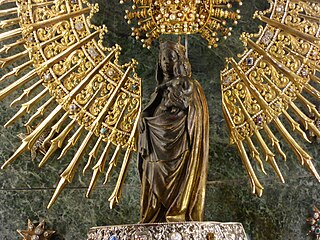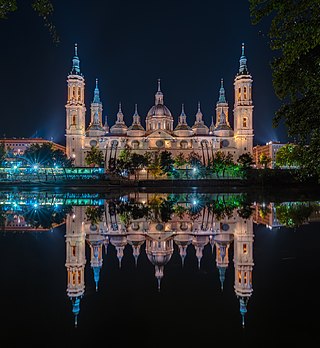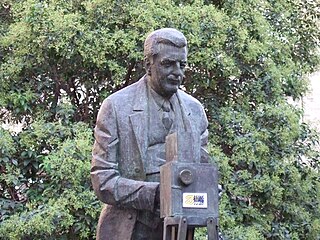The following is an overview of the events of 1897 in film, including a list of films released and notable births.

Our Lady of the Pillar is the name given to the Blessed Virgin Mary in the context of the traditional belief that Mary, while living in Jerusalem, supernaturally appeared to the Apostle James the Greater in AD 40 while he was preaching in what is now Spain. Those who adhere to this belief consider this appearance to be the only recorded instance of Mary exhibiting the mystical phenomenon of bilocation. Among Catholics, it is also considered the first Marian apparition, and unique because it happened while Mary was still living on Earth.

The Cathedral-Basilica of Our Lady of the Pillar is a Catholic church in the city of Zaragoza, Aragon. It is dedicated to the Blessed Virgin Mary under the title of Our Lady of the Pillar, praised as "Mother of the Hispanic Peoples" by Pope John Paul II. It is reputed to be the first-ever church dedicated to Mary.

The art of motion-picture making within Spain or by Spanish filmmakers abroad is collectively known as Spanish Cinema.

María del Pilar Cuesta Acosta, known professionally as Ana Belén, is a Spanish actress and singer. She and her husband are considered symbols of the Spanish Transition, and her songs and albums often feature boldly-titled works with social and political content.
Emiliano Zuleta Baquero was a Colombian vallenato composer, accordion player and singer, popularly known as El viejo Mile. In 1938, he published his masterpiece La gota fría, a song that emerged from a musical controversy with Lorenzo Morales and that years later Carlos Vives and Julio Iglesias would interpret, turning the song into an international hit.

Calanda is a town in the province of Teruel, Aragon, Spain. It lies on the southern fringe of the Ebro river basin, at the confluence of the Rivers Guadalope and Guadalopillo.

Eduardo Jimeno Correas was a Spanish filmmaker and producer. He is considered one of the pioneers in Spanish cinema.
Urrea de Gaén is a municipality located in the province of Teruel, community of Aragon, Spain. According to the 2004 census (INE), the municipality has a population of 568 inhabitants.

Manchones is a municipality in the province of Zaragoza, Aragon, Spain. According to the Spanish Statistical Institute (INE), the municipality had a population of 123 inhabitants in 2010. The pueblo is in the comarca of Campo de Daroca, about 6 kilometres (3.7 mi) northwest of Daroca and just southeast of Murero in the Calatayud-Daroca depression. The Jiloca River passes to the west.

The Fiestas del Pilar are an annual festival celebrated in the city of Zaragoza, Aragon, in honour of the patron saint of the city, the Virgen del Pilar. The week long festival takes place every year, usually, beginning the weekend of or before 12 October, and lasts until the following Sunday.

Anything for Bread is a 1991 Spanish film directed by Enrique Urbizu and written by Luis Marías.

Pilar Castro is a Spanish film, television and stage actress.
Pili and Mili was a comic acting duo composed of twins Aurora and Pilar Bayona. They rose to fame in early 1960s, becoming one of the biggest stars of the "child prodigy" movie genre that enjoyed a boom at the time. Their movies were musical comedies based on the same formula of mistaken identities.

Paula Ortiz Álvarez is a Spanish director, screenwriter and producer who works for Get in the Pictures Productions and Amapola Films, teaches Audiovisual Communication at the University of Barcelona, and collaborates with the University of San Jorge in Zaragoza.
Juan Simón's Daughter is a 1935 Spanish musical drama film directed by Nemesio M. Sobrevila and José Luis Sáenz de Heredia. It is based on the musical play La hija de Juan Simón by Sobrevila. A second film version Juan Simón's Daughter was released in 1957.

Agustina of Aragon is a 1950 Spanish historical film directed by Juan de Orduña and starring Aurora Bautista. It is also known by the alternative title of The Siege. It portrays the Spanish patriot Agustina of Aragon, known for her role at the 1808 Siege of Zaragoza against Napoleon's French forces.

Pilar Palomero is a Spanish film director and screenwriter.
This page is based on this
Wikipedia article Text is available under the
CC BY-SA 4.0 license; additional terms may apply.
Images, videos and audio are available under their respective licenses.












